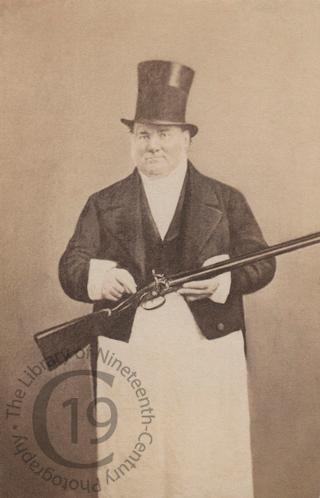
The Bishop of Bond Street
William Bishop was born in Ealing in or about 1797. While still a young man, he became the agent for the gunsmiths Westley Richards, opening a shop that under his management became something of an institution during the Regency: ‘the young bloods, officers, fashionable country squires, in their idle moments could always find a cure for ennui at the Bond Street rendezvous’ (Experts on Guns and Shooting, George Teasdale-Buckell, 1900). Bishop himself became a legendary figure among young Regency bucks and sportsmen.
When the census was taken in 1861 he was a widower living with three servants above the shop at 170 New Bond Street. He gave ‘Gun and Silversmith’ as his profession.
He died there on 16 March 1871, leaving an estate valued at £10,000.
Many newspapers carried an obituary for him. The one following is taken from the Morning Advertiser (20 March 1871):
‘Mr William Bishop died in his 74th year last Thursday night, at 170, New Bond-Bond-street where he has resided in the capacity of agent to Mr Westley Richards for 50 years. Deceased was a remarkable character in his day, being always full of wit and good humour, except in cases where anyone was trying to get the best of him. His large figure, with his snowy-white apron and extensive shirt cuffs, will be missed by the gun-room at the back of the shop; nor will leading sportsmen and politicians ever again listen to his anecdotes of events which occurred during his early manhood. It was his delight to converse with men of letters and other distinguished characters, by whom he was much respected; and until within the last few weeks, when weakness produced by gout had compelled him to retire to his room, he was at times as cheerful and as full of fun as ever. Although members of the Royal family and other persons of distinction were accustomed to attend his “levées,” which were usually held between four and five o’clock in the afternoon, and to which none but a privileged few were admitted, he never forgot himself. Unlike Sir Pertinax MacSycophant [a fawning character in Charles Macklin’s play The Man of the World] he always stood straight in the presence of great men, yet it is said he never contradicted a gentleman in his life. His powers of persuasion were great, and it was quite a treat to see him when in the act of disposing of a rifle or a pair of guns. He had sufficient influence to cause a bill for the prevention of dog stealing to pass the Lords and Commons some 15 years ago [….] He scarcely interfered in politics, as he once told the writer that nearly all politicians were alike when they got into power […]. The late Duke of Wellington, and other notables, always spoke of him as “The Bishop of Bond-street,” by which title he has been known for years; in fact, his letters were invariably so addressed, and there was scarcely a cabman in London but who knew “the bishop” by repute, if not by sight, in proof of which may be mentioned that about twelve years since a clergyman from the country hailed a cab and told the driver to take him to the Bishop of London’s residence. After a short ride the cab was stopped in front of 170, Bond-street, and it was not until that the cabmen discovered his mistake.’
George Teasdale-Buckell’s book includes an evocative word picture of William Bishop: ‘A large and roomy man, old Bishop, sitting in front of the old white mantelpiece … his gouty leg up on a chair before him. Dressed from head to foot in the blackest of black, a huge white frill proceeding from his breast, and an enormous pair of shirt cuffs turned back over his coat sleeves, and a neatly brimmed hat, which no mortal eye had ever seen off his head. A truly right reverend and Episcopal figure, and worthy of the only Bishop who had ever passed an Act through Parliament, as it was his wont to boast concerning the Dog Act, termed Bishop's Act.’
The firm of Westley Richards still exists, though they now operate from their factory in Birmingham. According to their website, Bishop’s Act was passed in 1845. It was inspired ‘by the one-time theft of his adored pet dog, Tiny. He was aghast to discover that a man could go to jail for stealing a dog collar but not for stealing a dog, so he threw his weight behind a bill which outlawed the stealing of dogs. […] When Tiny died, Mr Bishop erected a marble monument with a full inscription on the front of the New Bond Street shop (which is now housed in the Birmingham factory).’
Photographed by the Southwell Brothers of London.
Code: 127851




